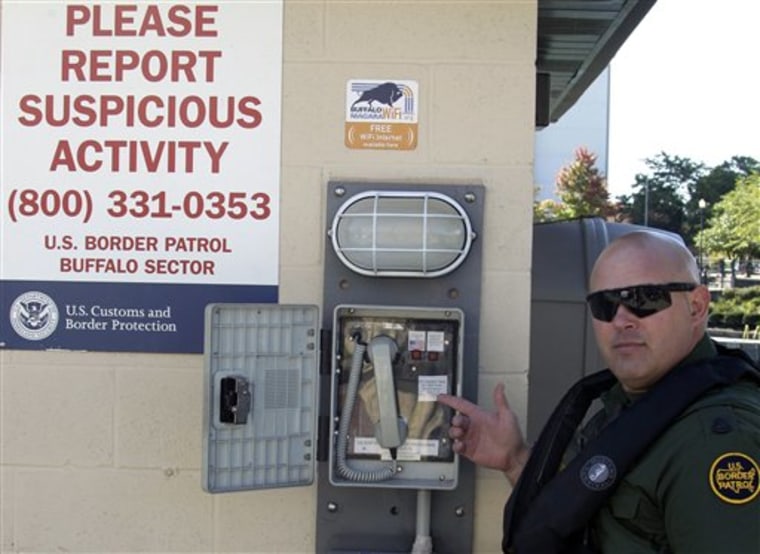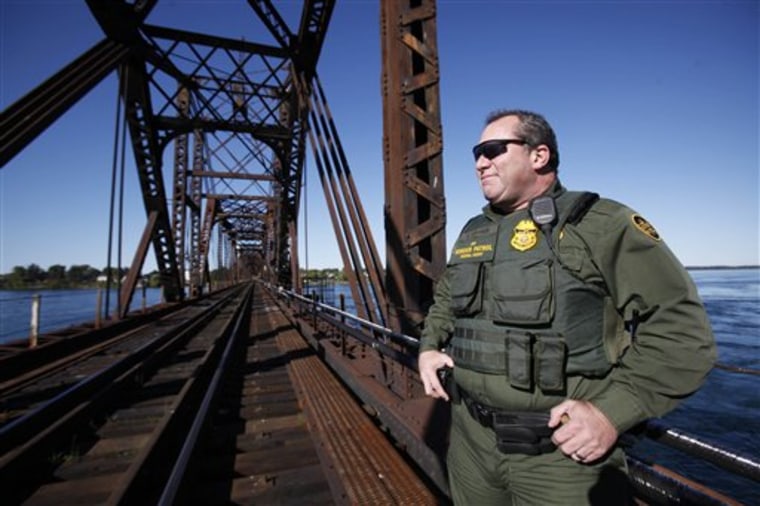The U.S. Border Patrol has quietly stopped its controversial practice of routinely searching buses, trains and airports for illegal immigrants at transportation hubs along the northern border and in the U.S. interior, preventing agents from using what had long been an effective tool for tracking down people here illegally, The Associated Press has learned.
Current and former Border Patrol agents said field offices around America began receiving the order last month — soon after the Obama administration announced that to ease an overburdened immigration system, it would allow many illegal immigrants to remain in the country while it focuses on deporting those who have committed crimes.
The routine bus, train and airport checks typically involved agents milling about and questioning people who appeared suspicious, and had long been criticized by immigrant rights groups. Critics said the tactic amounted to racial profiling and violated travelers' civil liberties.
But agents said it was an effective way to catch unlawful immigrants, including smugglers and possible terrorists, who had evaded detection at the border, as well as people who had overstayed their visas. Often, those who evade initial detection head quickly for the nearest public transportation in hopes of reaching other parts of the country.
Puzzling directive
Halting the practice has baffled the agents, especially in some stations along the northern border — from Bellingham, Washington, to Houlton, Maine — where the so-called "transportation checks" have been the bulk of their everyday duties. The Border Patrol is authorized to check vehicles within 100 miles (160 kilometers) of the border.
The order has not been made public, but two agents described it to the AP on condition of anonymity because the government does not authorize them to speak to the media. The union that represents Border Patrol agents planned to issue a news release about the change Monday.
"Orders have been sent out from Border Patrol headquarters in Washington, D.C., to Border Patrol sectors nationwide that checks of transportation hubs and systems located away from the southwest border of the United States will only be conducted if there is intelligence indicating a threat," the release says.
Those who have received the orders said agents may still go to train and bus stations and airports if they have specific "actionable intelligence" that there is an illegal immigrant there who recently entered the country. An agent in Washington state said it's not clear how agents are supposed to glean such intelligence, and even if they did, under the new directive they still require clearance from Washington, D.C., headquarters before they can respond.
A U.S. Customs and Border Protection spokesman, Bill Brooks, repeatedly insisted that any shift in enforcement tactics does not amount to a change in policy as local commanders still have authority to aggressively pursue illegal immigrants near the border and at transportation hubs.
In a separate statement, the agency said, "Conducting intelligence-based transportation checks allows the Border Patrol to use their technology and personnel resources more effectively, especially in areas with limited resources."
Arrests declining
The Border Patrol, which patrols outside the official ports of entry handled by customs officers, has dramatically beefed up its staffing since 9/11, doubling to more than 20,000 agents nationally. Along the northern border, the number has jumped from about 300 in the late 1990s to more than 2,200.
At the same time, the number of Border Patrol arrests nationwide has been falling — from nearly 1.2 million in 2005 to 463,000 in 2010, and 97 percent of them at the southern border, according to the Department of Homeland Security's Office of Immigration Statistics. The office cited the recession as a likely factor in the drop.
Along the northern border last fiscal year, the agency made 7,431 arrests. It was not immediately clear how many stemmed from routine transportation checks. The public affairs office for the Border Patrol's Blaine sector said it doesn't break down the data that way.
But of 673 arrests in the sector, roughly 200 were from routine transportation checks, according to a Washington state-based Border Patrol agent who has been with the agency for more than 20 years and spoke to the AP.
Doug Honig, spokesman for the American Civil Liberties Union of Washington, welcomed the news.

"If the Border Patrol is indeed not boarding buses and trains and engaging in the random questioning of people, that's a step in the right direction," he said. "People shouldn't be questioned by government officials when there's no reason to believe they've done anything wrong."
Kent Lundgren, chairman of the National Association of Former Border Patrol Officers, said the transportation checks have been a staple of the agency for 60 years. His organization has heard from agents around America complaining of the change, he said.
Gene Davis, a retired deputy chief in the Border Patrol's sector in Blaine, Washington, emphasized how effective the checks can be. He noted that a check of the Bellingham bus station in 1997 yielded an arrest of Palestinian Gazi Ibrahim Abu Mezer. Abu Mezer skipped out on a $5,000 bond — only to turn up later in Brooklyn, where New York police shot him as he prepared to bomb the city's subway system. Davis also noted that would-be millennium bomb suspect Ahmed Ressam was arrested at the border in late 1999 when he left a ferry from British Columbia to Washington in a rented car full of explosives.
"We've had two terrorists who have come through the northern border here. To put these restraints on agents being able to talk to people is just ridiculous," Davis said. "Abu Mezer got out, but that just shows you the potential that's there with the transportation checks."
